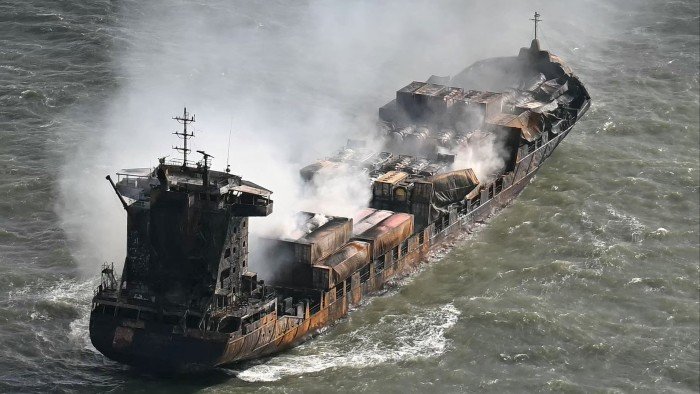Unlock the Editor’s Digest for free
Roula Khalaf, Editor of the FT, selects her favourite stories in this weekly newsletter.
The container ship that collided with a tanker carrying US military fuel in the North Sea is still on fire and is likely to sink, the UK’s maritime minister has said, as concerns grow of a pollution threat in British waters.
The Solong container vessel was still burning and had drifted southwards after colliding with the anchored Stena Immaculate tanker off the UK coast on Monday morning, Mike Kane told parliament on Tuesday afternoon.
Tug boats had been deployed to prevent the Solong from hitting the coast, although HM Coastguard had determined it was unlikely to remain afloat, he added.
After authorities worked since Monday to tackle fires on both ships, the blaze on board the Stena Immaculate tanker had “greatly diminished”, the UK’s coastguard said just after midday on Tuesday.
The ship, which was carrying up to 220,000 barrels of fuel for the US military, has suffered a rupture to a cargo tank, according to Crowley, which manages the vessel.
Counter-pollution measures had been put in place and both vessels were being closely monitored for structural integrity, Kane said.
The crash, which has also left one crew member presumed dead, had raised fears that it could develop into an environmental disaster.
The search mission for one crew member of the Solong had been called off and it was “our working assumption” that the mariner had died, Kane said.
HM Coastguard added that all 36 other mariners from both ships were brought safely ashore. It also said a crew member had not been taken to hospital but had been treated on the scene, contrary to what the coastguard previously said.


The jet fuel carried by the Stena Immaculate, owned by Sweden-headquartered Stena Bulk Marine Services, was the source of the fire, Kane added.
Authorities were still investigating how the collision occurred. Information from Marine Traffic, the vessel-tracking site, appeared to show the Solong container vessel, owned by Germany-based Ernst Russ, ploughing into the Stena Immaculate at speed while the tanker was at anchor.
“For a vessel to run into another one is incredible [and] therein lies the mystery,” said Martyn Boyers, chief executive of Port of Grimsby East, which has assisted in the rescue efforts.
Salvaging the vessels and the environmental clean-up “is going to be a big job for sure”, he added.
Ernst Russ denied earlier reports that claimed the Solong’s containers were loaded with sodium cyanide, a potentially highly dangerous chemical.
It said the ship, capable of carrying 803 20-foot containers, had “four empty containers that have previously contained the hazardous chemical and these containers will continue to be monitored”.
Melanie Onn, Labour MP for Great Grimsby and Cleethorpes, said local residents were concerned about the potential impact on the environment, adding that volunteers were being identified who could help rescue wildlife if needed.
She said questions were also being raised about the impact on air quality and if that could become a problem.
But the UK Health Security Agency had advised that the public health risk on shore was “currently deemed to be very low”, HM Coastguard said.
It added that the Department for Environment, Food and Rural Affairs had also “confirmed that air quality at ground level is currently within normal levels for the weather conditions”.
